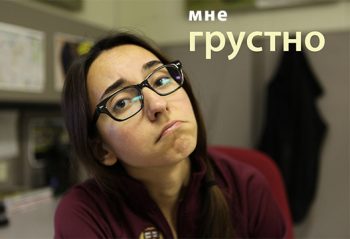Tag Archives: useful Russian phrases
When “Yes No Maybe” Is A Complete Sentence Posted by Nadya on Apr 22, 2020

Words or whole phrases, intonation, and stress are used to express confidence and uncertainty in speech. In the Russian language, as well as in other languages, there are formal and informal forms of expression. Let’s look at a few examples. Modal words Modal words (мода́льные слова́) in the Russian language is the category of words…
Don’t Worry About Gender or Number with These Russian Phrases Posted by Maria on Mar 5, 2020

Russian is notorious for its complex system of inflection. Oftentimes, it’s not enough to remember the dictionary form of the word—you need to take into account its gender, number, case, person, or tense, as the case may be. However, some very basic Russian words are not like that at all! We will look at some…
Meet Your New Friends: Russian Adverbs Posted by Jenya on Sep 23, 2014

The last few mornings have been relatively chilly, at least in the state of Michigan. As I was getting my fall coat out of the closet, it occurred to me that now is the perfect time to do a post on adverbs. “I don’t see the connection,” – you might say. Well, let me explain…
10 Particularly Useful Russian Words and Phrases Posted by Jenya on May 7, 2014

These particular words seem to come up in conversations time and time again. Some of them you may already know. Nevertheless, let’s see why the following selection became particularly useful for people trying to learn Russian. Где (where) appears to be a very convenient word because, unlike in English, you do not need to…
Fascinating Russian: Things you didn’t Know Posted by Jenya on May 6, 2014

А, Б, В are not just letters of the Russian alphabet but also words. Technically, there are 10 single-letter words in the Russian language: а, б, в, ж, и, к, о, с, у, я. «А» – conjunction, could be translated as “but, while, and, while, as opposed to” in English. Example: Я предпочитаю сырую…
Discovering Russia by Rail Posted by Jenya on Apr 2, 2014

The distance between Mogilev, the city where I grew up, and Orenburg, the city where most of my family live, is roughly 1250 miles. Every summer my parents and I would take a train there so I can spend the summer with my grandparents. The train ride was about 32 hours long but I always…
I get knocked down, but I get up again… Posted by Rob on Apr 24, 2013

In last week’s post, I mistakenly used the verb сваливать/свалить with the meaning “to physically knock down” — which seemed logical to me because, after all, the root verb валить means “to topple” and the noun валежник refers to “fallen tree branches.” Regular reader Fitzmat corrected me that сваливать/свалить, despite its etymology, is not generally…


